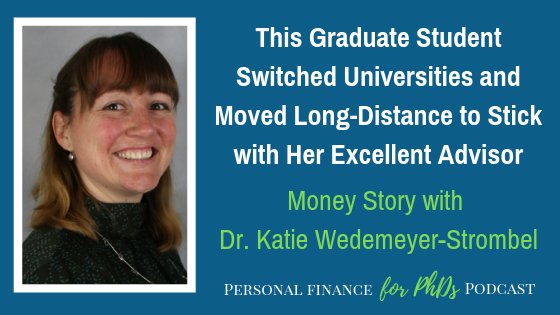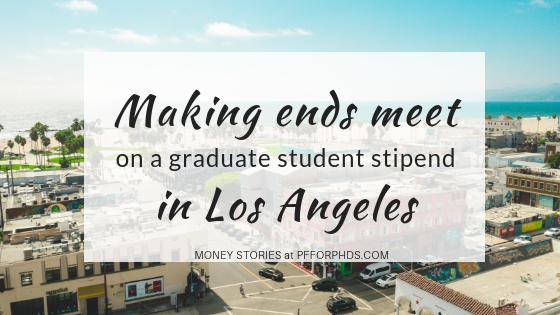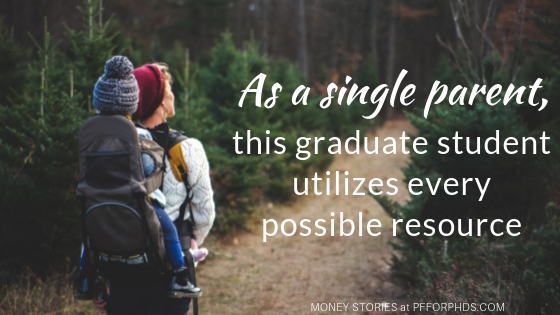In this episode, Emily interviews Dr. Katie Wedemeyer-Strombel, a recent PhD in environmental science and grad student advocate. Katie’s advocacy for her peers grew out of the challenges she faced during graduate school, particularly with respect to her first advisor. Katie details her decision to change labs and ultimately universities a couple years into her PhD and how she handled the financial and logistical aspects of moving from one side of Texas to the other. Emily and Katie discuss their advice for PhD trainees on how to choose a good mentor and preparing for the unexpected.
Links Mentioned in the Episode
- Personal Finance for PhDs: Speaking
- Katie’s website: (Katiewedemeyer.wordpress.com)
- Personal Finance for PhDs: Help Out (https://pfforphds.com/helpout/)
Teaser
00:00 Katie: I never could imagine that it would have happened to me. I applied to one program to work with a certain professor that I was really excited– it was my dream program to get into, my dream project I was going to get to be on– and I didn’t even think to ask around about what’s it like to work with this person.
Introduction
00:22 Emily: Welcome to the personal finance for PhDs podcast, a higher education in personal finance. I’m your host, Dr. Emily Roberts. This is season four episode one and today my guest is Dr. Katie Wedemeyer-Strombel, a PhD in environmental science and graduate student advocate. Katie’s advocacy for her peers grew out of the challenges she faced during graduate school. We discuss her decision to change labs and ultimately universities a couple of years into her PhD and in particular how she handled the financial and logistical aspects of moving from one side of Texas to the other. Katie gives excellent advice for every PhD trainee on how to choose a good mentor and preparing for the unexpected. Without further ado, here’s my interview with Dr. Katie Wedemeyer-Strombel.
Will You Please Introduce Yourself Further?
01:13 Emily: I am delighted to be joined today by Dr. Katie Wedemeyer-Strombel and she is going to be telling us about a time of upheaval during her PhD in a variety of different ways. So Katie, will you please tell us a little bit more about yourself?
01:28 Katie: Yeah, and thanks so much for having me. I’m really excited to be here chatting today. I just recently finished my PhD in environmental science at the University of Texas El Paso where I integrated social and natural science to help improve conservation, specifically of sea turtles is what I was looking at. I grew up in southern California in a quiet little beach town and I love to be outside in the mountains and the ocean, playing with my dog, hanging out with my husband. I lived in California for most of my life, did my bachelor’s degree at the University of California, San Diego, then worked at a small zoo and aquarium as the lead educator where I got to talk about science to kids of all different ages, which inspired the pursuit of my PhD where I started at Texas A&M. After my second year, I decided the environment I was in was not a good environment, a good fit for me. And so I left that lab, found a new one and finished my PhD with a new advisor and ended up moving to a new university across the state of Texas. So yeah, it was a long journey. It took me seven years total to finish my PhD. I am thrilled to be done with it recently. It’s still sinking in and I think that’s it.
02:46 Emily: Well you’ve moved again recently, right?
02:48 Katie: Yes, yes. So we just recently moved a couple of weeks ago to the Denver, Colorado area to enjoy a new place and a culture of being outside and exploring. We’re really excited to be in a place where we feel like we’re surrounded by like-minded people.
What Motivated You to Switch Labs?
03:08 Emily: Excellent. So glad to hear that. So let’s go back to just before again this time about people. When you were switching labs and ultimately switching universities. What motivated you to do that switch?
03:23 Katie: So for me, it was even starting early on my first year of grad school. I felt like I really knew what I was getting into. I had taken three years off between undergrad and grad school and I had worked with researchers at a federal research lab. I’d worked with grad students before in that capacity as well. So I felt really confident that I knew what I was getting into. And then I went to grad school and the department culture was not the healthiest. And then within my lab, it was a struggle kind of from the beginning. There were a lot of expectations of working really long hours and kind of going with the philosophy that graduate school is supposed to be miserable and a time that you’re suffering and you’re not allowed to be anything but a grad student or have any hobbies or anything outside of graduate school. If you showed interest in anything else or dedicated time to anything else, including family, then you would fail is essentially what I was told. So I just realized kind of midway through my second year that what I wanted and what I needed for my education and to be successful and in my life to be happy, I was not getting with the professors that I was working with.
04:34 Katie: So, thankfully to the support of other faculty members and to my cohort, I recognized that this was not a good situation for me– that thinking every day, oh man, I don’t think I can do four more years of this. I don’t know that I can make it through that, feeling that way every day, and just realizing that what I was feeling was not how graduate school had to be. It is how it is, unfortunately, for a lot of people, but it’s not how it has to be. It can be a much more positive and a better experience. And so I was able to leave my lab, in part hugely to receiving a National Science Foundation Graduate Research Fellowship, which really helps give me freedom because it was a lot easier to approach new professors having that credential. I was able to find my new advisor who had a really positive way of mentoring her students. Still challenging, still high expectations but in a very positive manner, which for me was the kind of environment that I really needed to thrive. So she initially was still at Texas A&M when I moved into her lab at the beginning of my third year, but she was looking at and then eventually took a job about 12 hours across Texas at the University of Texas El Paso. So after third year my husband and I moved across Texas and started up and spent another four years in El Paso where we finished school.
Warning Signs for Unhealthy Labs
06:09 Emily: Yeah. Thanks for that kind of overview and we’ll be getting into quite a bit more into various components of that story. For someone else who is entering graduate school or entering a new research situation, maybe it’s postdoc, maybe it’s something else. What are the warning signs that they should be looking for for labs and groups to avoid if they have maybe a similar outlook on life as you do that graduate school, that research, should not be consuming 100% of your life?
06:40 Katie: Yeah, that’s a really good question. I think the biggest thing is ask students, ask postdocs working in the labs you’re interested in joining, current students and former students or postdocs and you know, get them on the phone or if you’re there in person, take them out to coffee. Ask them, if you could do it again, would you work with who you’re working with? And take that answer seriously. On the phone or in person, people will be much more candid than say in an email because there’s no track record of it. And in my experience, when I was switching labs, I did a lot of investigating on that front. Talk to a lot of students and collaborators that worked with the people I was looking to work with and, in my experience, students and postdocs were very open and willing to chat with me on the phone or in person.
07:31 Katie: So that’s a big thing, but I think, looking into what is the culture like in that lab or in that department, in that town. Do they emphasize binge drinking as a way to blow off steam and the one way to deal with burnout– which doesn’t actually deal with burnout, it just adds to it. Do they encourage you to take time off to be with your family? Do they seem to have expectations that all you’re going to be doing is your work or do they seem to promote, “Hey, you like that band, why don’t you go to that concert?” Or “Hey, your family has an opportunity to all be together. Why don’t you go do that?” So really asking questions about how do you feel about taking time to see family? How do you feel about my work schedule? If I’m a better worker from 5:00 PM till midnight, is it okay if those are the hours I’m in the lab rather than 7:00 AM till 4:00 PM or whatever works best for you. So getting a feel for what you need and what’s going to work for you and asking those questions to who you’re working with, to people in the department that you’re thinking of joining and especially to the students who are already experiencing that. I think that that’s something that I didn’t do initially that I wish I would’ve done to get a better idea of what I was getting into.
08:55 Emily: I think there are some, I’ll say graduate students especially, who have a beggars can’t be choosers kind of attitude towards their selection of university or program or advisor. And that really may be the case if you have only gotten into one place or only one person will accept you into his or her lab. But the thing is that, as you experienced, if the culture and the work style and whatever it is about the group does not mesh well with what you want, you’re not going to end up being successful anyway. Like it doesn’t matter if they were the only one, if it’s going to put you through way too much strain or you’re going to have to leave their program, whatever it is. I mean it’s hard to say no to like your only opportunity or an opportunity that you would really like to think that it might work. But it’s just about more being honest with yourself that it’s not going to work and the PhD is a long time. It’s not the kind of time period that you can suck it up and power through for five plus years. And hey, it may take even longer if you’re struggling, you know? So it seems to be very, very wise to be very selective on the front end, even if it means turning down what might otherwise seem to be a really good opportunity.
Advice to the “Exceptions”
10:06 Emily: So when I was in graduate school, my husband and I were both very fortunate to have supportive advisors who were the kind of advisors that you’re talking about who didn’t have crazy work expectations, were supportive of family and so forth. But my husband considered joining a lab that had a little bit of a reputation, known among the students for being a more challenging lab to be in and with a more challenging advisor to work with. And I remember he heavily considered joining that lab but ultimately did not, all to the good. And I remember at a later point in graduate school, one of my friends who was a first-year or something, was rotating through labs and considered working with, again, another advisor who had a reputation as being a very difficult person to work with. And having had the experience my husband had, he was counseling this person to, as you were saying, take very seriously what other students, former lab members especially have said about this person to him. And ultimately he decided to join that lab. And he did graduate. But it’s just, I don’t know. What would you say to a person who thinks, “I’m going to be the exception? I’m not going to have that experience in that lab that 80% of people are having.”
11:24 Katie: Yeah, that’s a really good question. People leave labs for a lot of different reasons and sometimes people can be successful in an environment that was very unsuccessful and unhealthy for other students. And so that does happen. It’s not necessarily always like a nuclear situation when people leave labs. But because I’ve shared my story pretty transparently, I’ve heard a lot of horror stories. A lot of people have privileged me with sharing their experiences with me as well. And it’s a risk, I think, to join a lab that you know has a bad reputation. That’s a really good question. Thinking about what to say to a student that thinks that it’s not going to happen to them. I never could imagine that it would have happened to me. I applied to one program to work with a certain professor that I was really excited– it was my dream program to get into, my dream project I was going to get to be on– and I didn’t even think to ask around about what’s it like to work with this person, what it had been before. I probably would have ignored that anyway because I didn’t know any better. I didn’t know much about graduate school really at the time when I was getting into it. You know, it’s a risk, but to a student that thinks that they can go into a lab that doesn’t have a great reputation and thinks they can be successful: If they really want to try and they don’t have other options, they can try and they’re not stuck.
12:51 Katie: That’s a big thing I like to encourage graduate students to recognize is that you are not stuck. Just because you signed up for one program does not mean that that means you are locked into it for five, six, seven years, however long it takes. With the caveat of if you’re an international student, changing is a lot harder because you have visa issues, you have to deal with, you need the sponsorship of a lab. So there are a lot of extra obstacles that international students, underrepresented minorities face that, for example, I didn’t face when I was going through it. But there are options. And so, if the student feels really confident in joining a lab that other people have maybe warned them about, it’s their education and their life and if they decide that they want to take that risk, that just that they know, if for some reason it doesn’t work out that they’re not stuck in that environment, they’re not trapped. They don’t have to prove to anyone that they can withstand whatever treatment they’re getting, that if they’re unhappy or it’s an unhealthy environment that it is okay to say, “I have to leave this environment and find a different one.” Whether that different one remains in grad school or is a total different industry or career change. I think that would be what I would say.
The Advantage of Lab Rotations
14:17 Emily: I think I would add to that: if you know you’re taking a gamble with a certain lab to just be even more intentional about developing relationships with faculty members outside of that one. And it really depends on your program, how much that’s encouraged or not, but you should just take even more of that on for yourself to sort of look around and say, “okay, what are other people I can go to here either to help me stay in the current lab and give me advice, or what have you, support, collaboration, or a potential new advisor to switch to if this one doesn’t work out.” This is one reason why I really liked the system of doing rotations that some fields and some programs had. I personally didn’t do rotations in my lab. Sounds like you didn’t either. But I just think it’s a great idea to try on a lab for a semester or what have you and be able to make a better evaluation at the end of that. So, if you have the opportunity to go to programs that offer rotations, I think it’s a real advantage.
15:14 Katie: Yeah, absolutely. And I know I have a couple of friends who ended up switching labs into a lab of someone else that they had done a rotation with. And so they knew, “well, my interests overlap with this person. I liked that environment. It was a better fit for me.” And so I actually know a couple of students who eventually changed into a rotation lab. And just one more thing that I wanted to add on on this topic is that we keep mentioning labs that have a reputation. And so much of the onus is on the student to navigate this, but what students really need is faculty, especially tenured faculty and administrators in these departments that know that their department and/or faculty in their department have these reputations. People know about it. It’s not surprising when a student leaves the lab, people know their reputation. And yet, those professors still get funding for TA-ships or RA-ships to have students in their lab when there’s a known cycle of either inappropriate behavior of a variety of types or just of being a really negative environment that can emotionally hurt a lot of students. And so it’s a systemic issue and a lot of students are talking out more and more about it. And on Twitter, a lot of faculty are talking out more and more about it and it’s definitely becoming something that in my experience, even like some graduate deans are paying more attention to.
16:44 Katie: But really, the students need the help of established folks in the fields and we need them to help either watch out for students that join those labs or to talk to their colleagues and say, “Hey, your behavior is inappropriate. It’s not okay to treat students like that.” Because so much of the onus is on students. So much of having to navigate changing labs is on the students with zero support from the institution or other faculty unless they’ve already had the opportunity to carve out relationships with other faculty who will advocate for them. So, I talk about this a lot and so much of the advice which is important is to give to students to look out for red flags and what to do in that situation. But I always like to add, we need the help of folks that are more established that already know of these reputations to say, “hey, maybe don’t work with that person or if you get stuck or something seems off, come talk to me.” Just knowing that students have the support and knowing that faculty are working to help fix this problem is going to be a huge step forward I think for academia in general.
Helpful Policies
17:56 Emily: Yeah. Just to add on that, I think that either having policies in place or enforcing policies that are already in place regarding, for instance, the time devoted to work usually is officially limited. For a TA or an RA position often it’s 20 hours per week. How about that’s actually tracked and actually changes are made if students aren’t able to get their work done or whatever it is within that period of time. Also, about vacation policies. I remember during graduate school, midway through when I was in grad school, there was an official vacation policy implemented for Duke overall. And it basically said, I think, that students can have two weeks or more if their advisor wants to give them more. Often international students need more than two weeks at once. So it’s a two weeks or more policy. So it was kind of a good thing because I think often when policies are proposed, people are nervous that the policy could detrimentally affect them. Like maybe I take more than two weeks of vacation per year and my advisor is okay with it, but two weeks would limit me. So that was kind of a good phrasing. Like it had to be at least two weeks. And so that’s at least a policy that could be pointed to. Someone needs to take time off, and if the advisor’s not respecting that, then maybe again someone a level up can start intervening in that situation.
Commercial
19:11 Emily: Emily here for a brief interlude. Through my business, I provide seminars and webinars on personal finance for graduate students, postdocs and other early career PhDs for universities, institutes, conferences, associations, etc. I offer seminars that cover a wide range of personal finance topics and others that take a deep dive into the financial topics that matter most to PhDs like taxes, investing, career transitions, and frugality. If you are interested in having me speak to your group or recommending me to a potential host, you can find more information and ways to contact me at pfforphds.com/speaking. That’s p f f o r p h d s.com/speaking. Now back to the interview.
Challenges with Changing Institutions
19:59 Emily: Thank you so much for that discussion. But moving on to the happier end to that story. You got into the new lab, but you knew from the beginning that there was a move upcoming. That your new advisor was looking around and ultimately did move. So, what were the challenges associated with that of moving and changing institutions partway through your PhD?
20:22 Katie: Yeah, so there were a few different aspects of that. First was my, at the time fiancé and my now husband, he moved out. He was a professional chef for many years in southern California and he walked away from that in California and moved to Texas since we knew I was going to be there for a while and we wanted to be together. So he moved out to Texas two months before I left my first lab. And so he had just gotten there and we stayed there for another year. And so, I had a really strong support system with my cohort. My original cohort mates were just phenomenal and still some of my best friends. And my husband moved out, got a good job and became really close friends with a lot of my cohort mates, some friends on his own as well. And so we lived there for a year and a half and then we had to move and move away from the support system that had seen us through a tough time, that had celebrated our marriage with us. And that was a really tough thing to have to move away from that support system. That was tough both personally, but also we lost support for if we needed help with anything or a place to crash or if we needed just, you know, what you lean on your community for. We had to walk away from all of that.
Financial Considerations
21:45 Katie: And so that was tough and we had just paid for my husband to move from California and then we had just had our wedding and we moved like two months after our wedding. The move itself cost us probably like total $3,500 that we didn’t have lying around. It wasn’t something we had planned for or had expected. We were really fortunate that my parents were able to lend us some money so that we could kind of basically take an interest-free loan from my parents. Not everyone has that option. So we were really, really fortunate to have that to lean on or else we wouldn’t have been able to pay for the moving truck, for instance, to move our stuff across Texas. Because it’s like a 12-hour drive basically from east Texas out to West Texas. And having to put down a new deposit on an apartment, having to start building a life there again and moving everything. And then starting over with no support system was really tough. Again, just didn’t have a place to crash if we needed, didn’t have friends to lean on that were local. And so that added, increased pressure on us in a lot of different ways, both like academically and personally. And so those were the biggest things, having to find all new doctors, having to pay copays to go and do like the initial appointment with the doctors and then just kind of going through all of that and moving. The cost of living was a little bit more expensive where we moved to in El Paso just because it is a city. Not a lot but a little bit more. So that was something that we weren’t totally prepared for either. So those were the big things I think.
Logistical Considerations
23:49 Emily: With the actual moving itself: so, the lab that I was in in graduate school, the reason that I graduated at the time that I did was because my advisor decided to change institutions. It was kind of like he graduated like six or seven people and moved some, some stayed at Duke. So I got to see the front end of the packing up of the lab and I assisted with that. But I was basically out of there at the same time that the move was actually happening. So I’m just curious how much sort of downtime there was for the lab as a whole and also for you to actually do the move physically of the lab and also of yourselves and how much of an interruption that was to your research? And whether that was like vacation time that you had to take or whether it was like, oh no, okay. Like this is something that my work is requiring me to do. So it’s like sort of papered over.
24:43 Katie: It was a pretty stressful time for us. So we got married on May 2nd, 2015. We had a destination wedding in Mexico, which was wonderful. So we took that time and then we took about a week after that to stay for our honeymoon. And then about two weeks later, I went down to my field site for the first time and I was there for about two weeks. And my field sites are really remote so I have very little communication abilities when I’m there. And then I got back home and we had to move out of our apartment I think by the end of May. So we packed everything up, put it in a pod, had that stored for a few months. My husband essentially moved in, we moved in with two of our good friends who had a house and an extra room and they let us stay there for June and July because I had a conference I was going to I think.
25:44 Katie: And I also had a two-week short course that I was going to. So I was doing some traveling as well. And so essentially we moved into a room in our friend’s house with just like a bag and our car’s worth of stuff and a bed and then shipped the rest of our stuff. So we didn’t have most of our stuff for a couple of months. And that summer was really crazy. I traveled a lot and my husband was finishing up work and then we had to drive to El Paso to look for apartments. I think we drove the 12 hours, stayed there for two days, had to get like a hotel and everything for him to go to orientation because he was actually going to be starting as a full-time undergraduate. He left the chef industry and was going back to school.
26:29 Katie: So he had to go to orientation for two days at the new university. So we took that opportunity to drive out there and spend a couple of days looking for apartments. So I think in July we drove out for two days, found an apartment right before we left, had to pay a deposit and then drove all the way back and then spent another couple of weeks in east Texas before we officially left and did the drive back out. So it was a really hectic time and it took away a lot of our honeymooning period where we didn’t really get to just “be.” And part of that we recognize in hindsight, because hindsight’s 20/20 or whatever they say. But we really should have taken more time to just be together and just enjoy being newlyweds. But it was really stressful packing up and leaving and packing up the lab.
27:27 Katie: I didn’t have a lot of stuff in that lab because I hadn’t been in there that long and I hadn’t really started my research yet. So that was a pretty easy thing, at least on my end to do. But yeah, it was a really hectic and stressful time for us. And then coming and getting settled and then jumping right into both being full-time students was challenging for us as well. I’m glad I did it because the advisor that I finished with, Tarla Rai Peterson, she’s so wonderful and was such a supportive and positive role model and still is for me. That was why we decided to make that move. It was a long discussion that my husband and I had before we decided to make that move was: is this worth it? Do we want to upheave our lives and have to go through all of this? And I could tell that this was a really good fit for me and it ended up being a phenomenal fit for me. So, I’m glad that we did it. I wish we would’ve done it a little differently and it would have been great to have planned a little bit more for an unexpected, anything really to come up, during grad school.
Advice for Making a Long-Distance Move
28:44 Emily: Yeah. I want to probe on that point just a little bit more as we finish. So speaking to another graduate student or early career PhD who’s maybe considering a big move like this. I don’t know if it’s optional or not, like this for you, you decided it was worth it. I guess technically it was optional, but you could see the advantages of sticking with that advisor. But like in, in my case, when my lab moved, many of the students were making a decision, do I move with my current advisor or do I try to find another advisor at my current institution? So both kind of for that situation, but also just sort of anyone more in general who’s facing a long-distance move. With this hindsight that you have now, what is your best advice for that person?
29:27 Katie: Make the move the most convenient it can be for you. We kind of did that in a few different ways. Like we paid the extra to have the pod that would store everything so we didn’t have to rent the cheap truck and load a storage unit and then unload it and drive it ourselves. Make sure that it’s going to benefit you to do that. It’s a lot of work to do a long-distance move. It’s hard to upheave your life and move to a new place. So definitely weigh the pros and cons. For me, the pros were hugely outweighing the cons. I would say be proactive of finding community wherever you’re moving to when it’s a new place. That can be really tough to do. It was hard for us.
30:12 Katie: We made a couple of good friends in our new place, but we weren’t there for very long and we both traveled a lot. And so we didn’t really find as full of a community as we had had previously. So think about where are you moving to? Is it a place that is going to make you happy? Just the location in general. That is a huge consideration. Think about community and how you’re going to build community when you get there and look into connections from other friends you may have from your network that’ll be there. And know that it’s going to cost some money. It’s expensive to move anywhere but especially long distance. But I think making that time as least stressful on you as you can by taking time to spend with your loved ones who are in the area. Whether it’s a partner, spend time with them just alone to really try to keep up the normal parts of your life and don’t let your move totally consume you, in the same way that I always say don’t let your research totally consume you.
31:14 Katie: It’s honestly because grad school can be so unpredictable and you don’t really know what’s going to happen if you’re going to have to move again or if you’re going to have to change labs or what that might mean for you. I think to always think that just because you sign up for a program for however many years doesn’t mean that that’s where you’re going to stay or end up. So just kind of always keeping in mind that you have options, that there can be change and that that change might require some resources that you maybe don’t have or hadn’t planned for. So planning for those resources, like trying to save money or people you can lean on that can maybe help you if you’re in a tight spot. Really think about those things. I know we already have a lot to think about, especially as new grad students, but I think just really planning for the unexpected because you never really know what’s going to happen or where you’re going to end up. And so just acknowledging from the beginning that something might happen and you might have to make a change is okay and just trying to have some support you’ve built for yourself in place to help you as you move through that.
Budgeting for the Unexpected
32:20 Emily: Yeah, I totally agree. And specifically on the financial resource, to put a little bit more of a fine, fine point on it. I mean having an emergency fund. Like okay, yeah, moving is not necessarily an emergency, but the thing is when you’re low income, like a graduate student, a lot of things qualify for emergencies that don’t sound like it. But it’s money for a necessary expense and it is unexpected to a degree. So just when you set up your budgets of your life, the first time in graduate school and your postdoc, just have a line item in your budget. It’s going be a small savings rate towards the unexpected as you said. Because the thing is, I mean, I’m always saying like money gives you options. So you were fortunate that you were able to lean on your parents to give you a loan.
33:04 Emily: That money gave you the option of moving. I mean, what if you didn’t have money yourself or didn’t have access to a loan like that? I mean, what really could you have done? Maybe you would’ve passed up this really fantastic opportunity to stay with this advisor. Maybe you wouldn’t have even finished graduate school. So yeah, just having money or having access to money is necessary at many points to sort of get to your career goals and have the life that you need to have. So yeah, if possible at all, build it into your plan that something unexpected is going to happen and you need to give yourself the option to say, to say yes to certain opportunities.
Advocacy for Graduate Students
Emily: So thank you so much, Katie, for sharing this story and being on the podcast today. How can people find you? And I understand you’ve been doing some speaking recently as well. Tell us about that.
33:52 Katie: Yeah. So, you can find me mostly on Twitter. My handle’s @krwedemeyer which is my last name, which I’m sure will be posted somewhere. You can find me on Twitter. That’s where I share a lot of my story and interact with a lot of wonderful early career academics and also established folks who share their stories as well. I was recently an invited keynote speaker at Ohio university’s graduate and professional student appreciation week celebration. And that was a really awesome opportunity to get to share my story and some advice to a room full of graduate students. And it was really cool to see them taking some of the things that I shared, like talk to each other about your struggles and your vulnerabilities, and hearing them actually go, “Oh yeah, I feel that way too. I didn’t know we could say that,” was just a really neat environment to be in. And I also got to speak with the dean of my graduate school and the Graduate Council. So a group of professors at UTEP who are in charge of graduate education and kind of the graduate school environment at UTEP.
35:03 Katie: And I got to speak with them about what we need as students and was able to work with them and they’ve now put on the docket for the fall to create an Ombud position. So, a confidential impartial person who graduate students can go to if they’re struggling with a lab or a professor they’re working with. And so they’re going to actually work to kind of create that position and fulfill that position so that students have more resources. Um, so I’ve been really thankful to be able to speak to both students and also to graduate deans and professors who are in charge of graduate schools. I’ve written a few articles for The Chronicle of Higher Education as well on these same topics, advocating for a healthier and kinder, but yet still intellectually challenging graduate school environment.
35:57 Emily: That’s excellent. And do you have a website for people to check out?
36:00 Katie: I do. It’s katiewedemeyer.wordpress.com.
36:04 Emily: Excellent. Well, thank you again for joining me today.
36:07 Katie: Yeah, thanks so much for having me. I really appreciate it.
Outtro
36:09 Emily: Listeners, thank you so much for joining me for this episode. Pfforphds.com/podcast is the hub for the Personal Finance for PhDs podcast. There, you can find links to all the episode show notes, a form to volunteer to be interviewed, and a way to join the mailing list. I’d love for you to check it out and get more involved. If you want to support the show and my business, please go to pfforphds.com/helpout. There are plenty of ways to do so without laying out any of your own money. See you in the next episode! And remember, you don’t have to have a PhD to succeed with personal finance, but it doesn’t hurt. The music is Stages of Awakening by Podington Bear from the free music archive and is shared under CC by NC.








